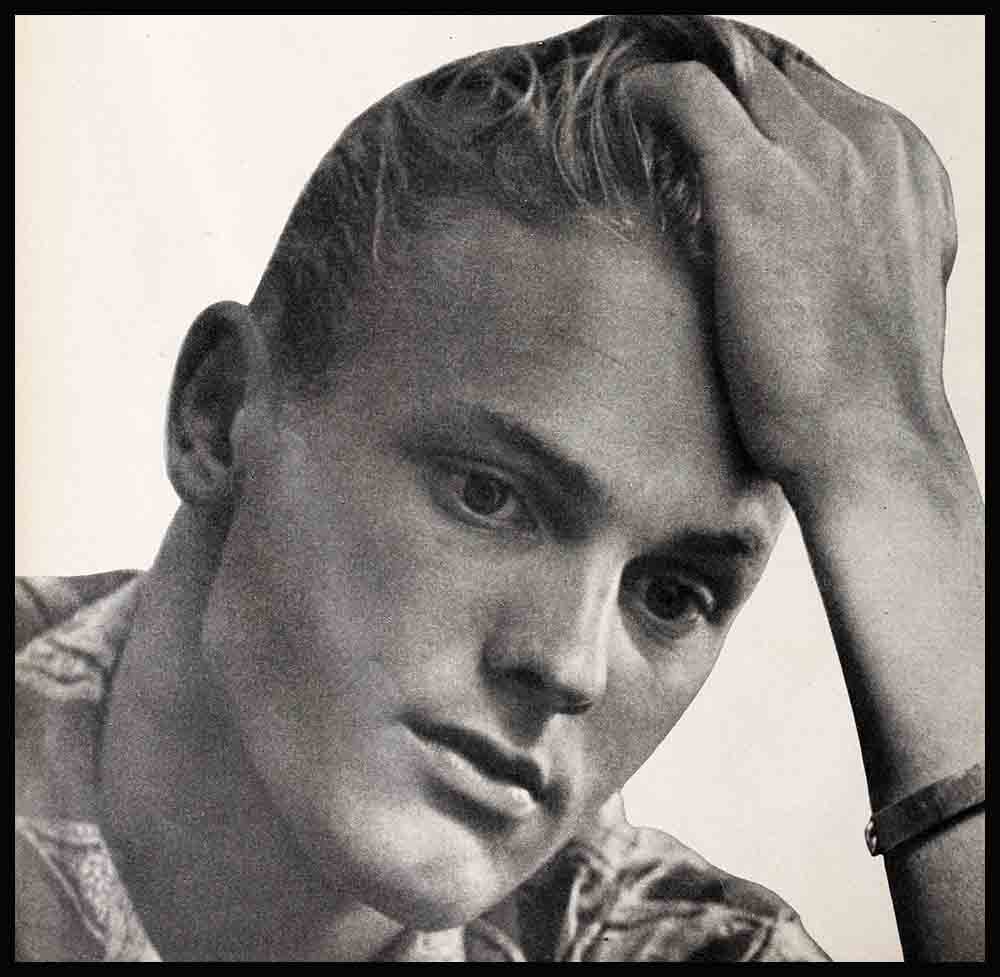
Why Tab Hunter Has Become Hollywood Biggest Headache?
At the spot in Los Angeles where the Sunset Strip melts into Hollywood proper, there are two adjacent establishments. One is a drugstore, famed Schwab’s, and the other a restaurant, Googie’s. They have something in common besides being neighbors. They are the gathering places, the hangouts, of Hollywood’s young and aspiring film players. Here the kaffeeklatsch is endless, the talk is nothing but shop talk—some of it meaningless, some of it penetrating, some gay, some bitter, some vicious.
And much of the talk these days is concerned with one of the group’s more distinguished alumni, the fellow Arthur Gelien, whom the young hopefuls, in common with most people, call Tab Hunter.
It is believed, in these rather discerning circles, that Tab Hunter has reached a crucial moment in his career. It is believed that now—or never—he is going onward and upward, and that there is no alternative but professional catastrophe. But there is little agreement on how the dice will fall.
AUDIO BOOK
“Tab,” observes a young contemporary who probably can fairly be suspected of malice or even jealousy, “is a freak. Nobody likes him but the people. I’m not kidding you. You talk to producers over at Warners’ and they’ll tell you he’s a headache. Except at the box office, where it counts. They can’t even figure whether he’s got talent or not.”
But this man’s young companion, a girl a little too well-known to want her name associated with anything controversial, takes issue with him. “How,” she says, “can they tag him with that no-talent label when they haven’t given him a chance to use his talent? Believe me, he does have it. I’ve worked with him and I know. I’ve seen it more than once.”

Knowing the importance of publicity, Tab teas always willing to pose for “beefcake” and date art
“You’ve worked with him and you still say he’s good?”
“I certainly do still say it. Furthermore, I mean it.”
It goes like that all the time—the admirers vs. the detractors of Tab Hunter.
Right from the start, his fan mail jumped to 4000 a week. On the other hand, that’s not as much of a barometer as you’d imagine. Spencer Tracy is lucky if he gets a postcard, and who’s going to throw away Spence Tracy? Still and all, it’s something. They figured Hunter had been hypoed, gimmicked, blown up to be that big, and that he’d explode like a pricked balloon. But he didn’t. He stuck in there. He’s solid now. So what do they do now?
And in the middle of all this is Tab Hunter, who really is Arthur Gelien, who perhaps stands off and observes Tab Hunter—as do many others—with a sense of disbelief, a sense of gratitude and of shock. Or disillusionment. Fame has come, and money, but not fulfillment. It is next to impossible to shed tears over the plight of a movie star who doesn’t get the roles he wants. Yet it is true that frustration is not confined to the lower deck. It chews on all equally, and if in the end it is not resolved, being a movie star comes to nothing. A discontented man beside his own swimming pool is still a discontented man, and no amount of expensively piped water is going to wash it away.
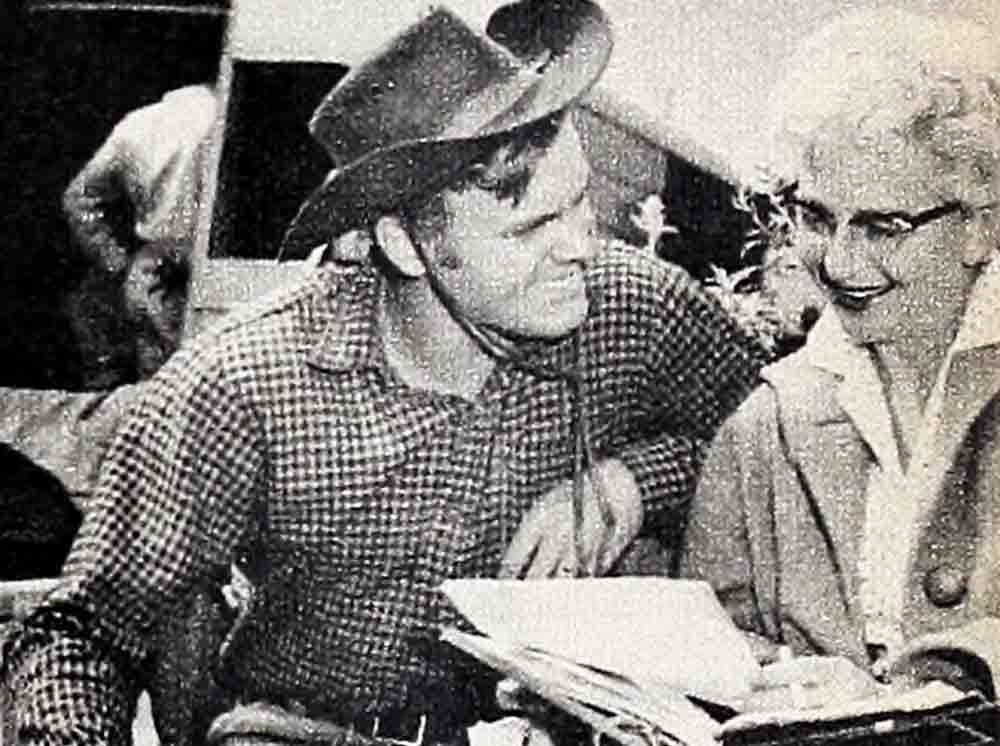
Knowing how much he had ta learn, he put away his ice-skates and knuckled down to study
And surely there is reason to believe that Tab Hunter is a not too happy fellow. The testimony is his own; you are about to read it. One day in early autumn, Tab Hunter followed his much-touted forelock into the commissary of the Warner studio, stopped at a wall table to talk with Natalie Wood, with whom he had lately made “The Girl He Left Behind,” and then went to the corner where friends waited.
“I’ve been crying all morning,” he said. Not for any personal reason, though. He’d been working on a film for Warner’s TV show for which tears were required. He hoped he’d done the scene well. His voice sounded dubious.
“With me,” he said, “it can be an ordeal. Studio people are hanging around, and their feeling comes across loud and clear. They’re so sure, so many of them, that I can’t act. I know it. Why kid myself? It’s part of being Tab Hunter. And, naturally, that shoots my confidence. As a result, I blow. What I want to know is, why are they so sure?” He ordered a light lunch and blew out his breath.
“It’s not enough,” he said in answer to a question. “It’s just not enough. For some actors, I know, it’s enough to have the money and the big deal—celebrity, or whatever you call it. But I’m going to throw a hub-cap one of these days. I can act, I swear I can. If they’d just give me a chance. No, it’s not off the record. There’s no secret about it. I’ve been to the brass and done everything but turn purple and roll on the floor, asking for parts. Parts that are parts. all they do is pat me on the head. Maybe they’ve been reading their own publicity about me. Just a chance— it’s not so much to ask for.”
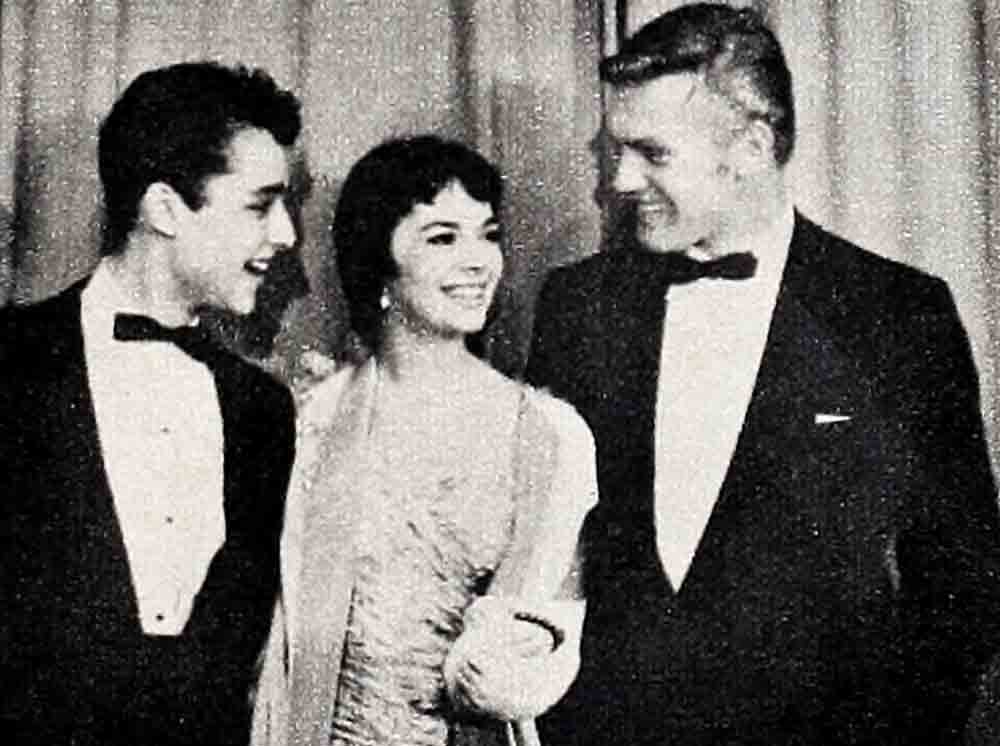
He did his studio’s bidding regarding dates, like one with Nat Wood and newcomer Sal Mineo
There was an interlude. Miss Wood came over and said she’d been dating Elvis Presley. Night before, as a matter of fact. “He’s intelligent rather than intellectual,” she said. “I like the intelligent ones better And you know something? He has no idea how famous he is. No idea at all.” Tab listened glumly. She went away.
“The fame kick again.” he said. “You know what I am? Or maybe now I can say was. I’m the phoniest sort of a star. I’m typical of the gimmick where the publicity’s a zillion miles ahead of the career.”
“Tab,” said a studio representative. It was a whole sentence in itself.
“No, I’m not kidding,” he said, stubbornly, “and I’m not knocking the pictures I’ve made. I’m talking about Tab Hunter, whoever he is. all the magazines, all the newspapers, all the fathead things they’ve had me say and do. It’s not fun. Sometimes I might even say it’s not worth it. But I won’t ever really say it because I want to act and I love to act. It’s all I care about, and sooner or later I’m going to get the chance.
“Incidentally, don’t think for a moment I’m putting the rap on publicity or the studio or the industry, God love ’em all. But if Tab Hunter wants to bat his head against a wall, who’s got a better right?”
A high Hollywood muck-a-muck had observed only the day before regarding this boy: “Tab Hunter’s the ultimate test of whether we’re an art or an industry. That’s if the faction who says he can’t act is right. If he can’t act, what’s he doing in an art medium? And why does the medium tolerate him? On the other hand, if it’s purely a question of box office, then how can you let him go? The boy next door is money in the bank.”
Of the boy next door, Tab now said: “There’s a jerk I could get along without from now on. That’s the whole point of what I’m getting at. I’ve nothing against the boy next door as such. But who is he? How do you know he’s not Count Dracula? And why is he necessarily Tab Hunter? You have your features thrown together in a certain way, and someone on the top floor or a reviewer, or the blessed audience, says you’re the boy next door. And that’s it. It’s like being branded. I work hard at this business. I’d like to see come my way a psychotic murderer, maybe, or a role that ages and mellows, or something of that sort. A part, a challenge! Without an occasional tough one, a player can die of spiritual malnutrition. The boy next door once or twice, yes. But please, God, not forever.”
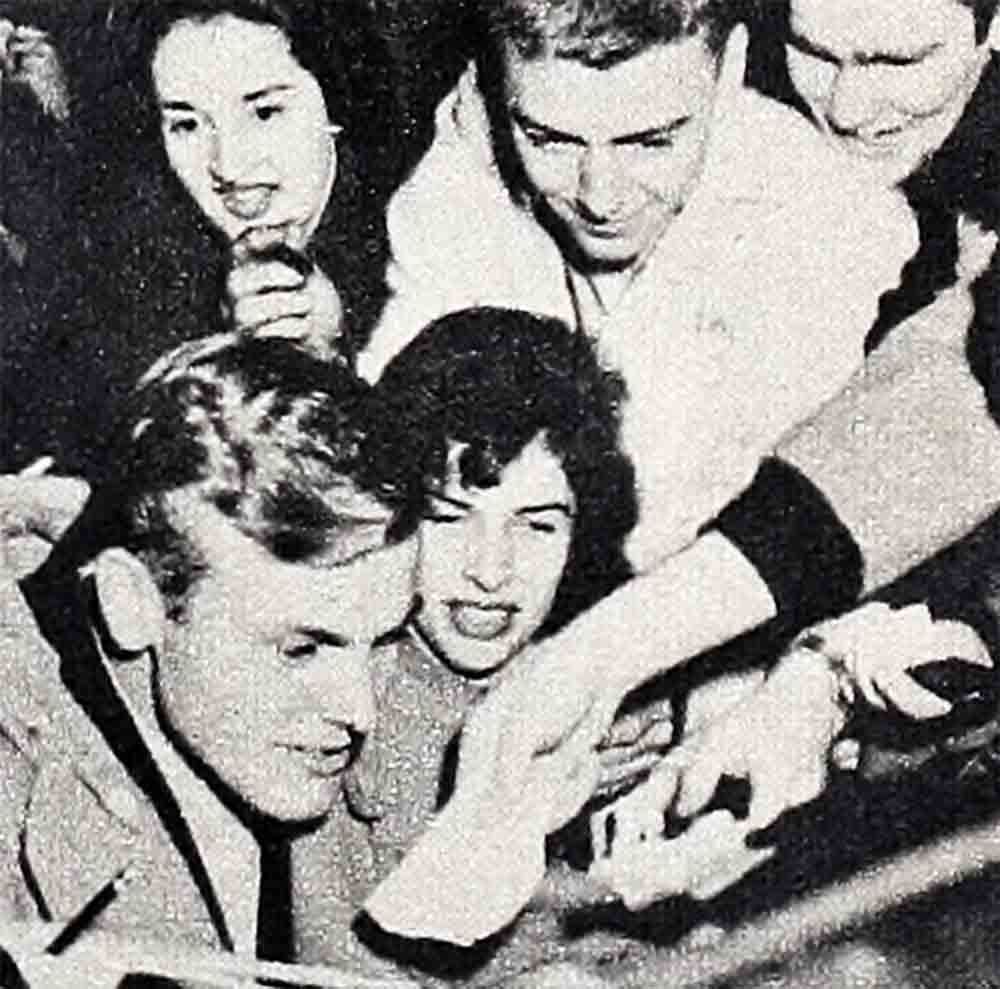
He worked hard to get fan mail and fan support, but did he limit himself too much to teenagers?
It was suggested to Tab that the law of supply and demand had to be a factor in the way he was cast.
He paused thoughtfully, then said, “Wait. I’m going to contradict myself here if I’m not careful. You’re talking about the young audience, my age and younger.” Hunter is twenty-five, and the general feeling is that his audience is mainly from the junior element.
“All right,” he said, after several moments’ thought. “If the kids insist, if they insist, then it has to be that way. I mean, God bless them, if it weren’t for them, I’d be in Nowhereville. But if it has to be the boy next door, can’t it at least be the boy next door done in depth and with feeling and—well, sensitivity? Look, I don’t want to be an actor, I want to act. That’s on the level The star bit’s great but it’s not enough. You have to do what you can do. You have to.”
He did then, after all, embrace stardom with some degree of warmth?
“I told you I’d contradict myself,” he said. “I’d be a fool to say no to that. It’s rough, but I guess it’s wonderful in its own special way. For instance, I get star billing Well, I wouldn’t settle for feature billing. It sounds hammy but it’s important. It’s not just your vanity, but good business, too You shouldn’t step down till they put their foot in your face. And that could happen.”
Suddenly his voice was intense and bitter. “I’m going to tell you something,” he said. “You come into this business as a kid and you believe in everyone and everything. Then you change. Something happens to you. And they ask, ‘What ever happened to that unspoiled, fresh-faced, innocent youngster who came on this lot a few years ago? Why has he changed in the way he has?’ Well, don’t they know? It’s not you that changes, not me! Not from the inside, I mean. It’s some of the people you meet and the things they do to you along the way! They make the changes and you’re the end product!”
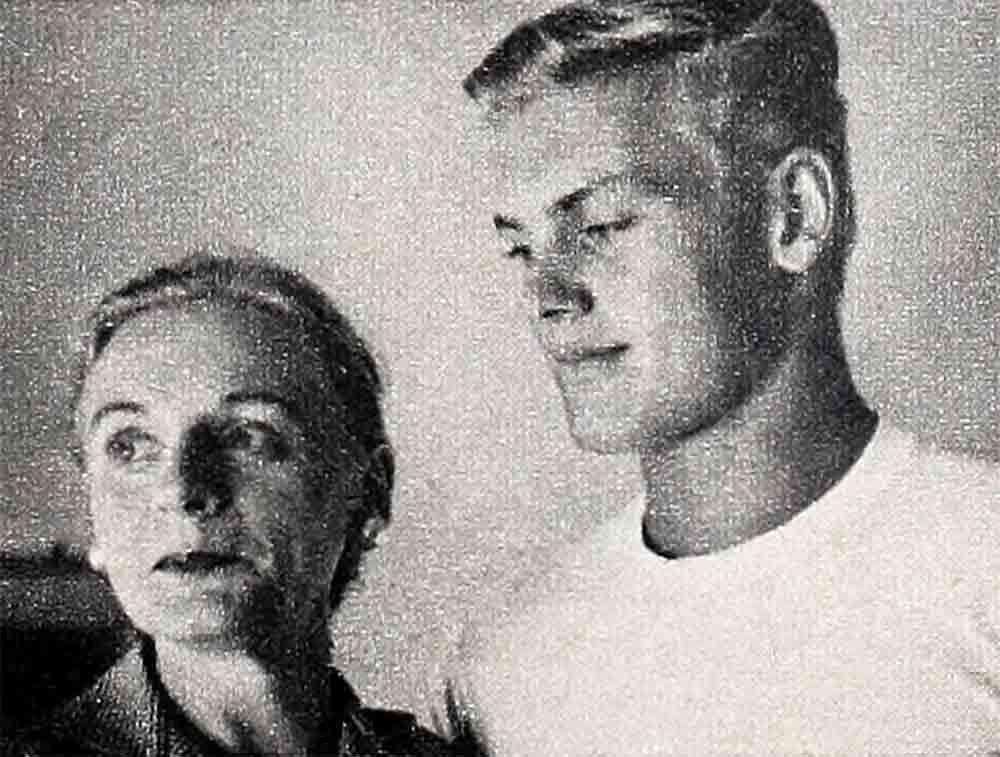
Mrs. Gertrude Gelien, his mother, says, “You’ll be a star and an actor.” Tab hopes she’s right
For a moment, Tab looked about him, helplessly, as if looking for a friend. Then, his search given up, he came back.
“Oh, I’m going to quality that,” he said. “I’m not saying I’ve changed especially for the worse. And I’m not saying there aren’t a lot of wonderful people in the business along with the others. There are. But I’m not the shiny-faced, trusting kid I was and I’d better not be, for my own good. But my point is, you don’t change. Certain people and circumstances change you. It’s an outside job.”
For a little while, there, Tab Hunter had sounded like more than a baffled, unhappy young man. He had sounded like an embittered one.
Yet authorities on Tab Hunter claim that this is really not the case. They cite him as a fellow full of hope. next to indomitable, with no feeling that he cannot, in the end, confound his detractors and bring his professional stature to the level of his strange publicity—a kind of filling-out process.
“I’m going to win,” he has been quoted as telling a friend. “I’m going to lick it all. I don’t know when—this year or the next or the next. But I’m going to keep pitching and fighting for the audience that isn’t mine today. It’ll take two things, as I see it: fat parts and ordinary guts. I’ll work my head off studying. I’ll make any reasonable concession. So it’s got to happen.
“Someday Tab Hunter will command adult and professional regard, and nobody else will make my name part of a play title—if they did mean me—kidding the publicity end of the picture business. Maybe I did get off on the wrong foot, from a certain point of view. I cooperated with every publicity gag in the shop; sure I did. And I’m still not convinced I was wrong. You have to start somewhere and in some way. Of course, it would have been better if the actor had come first, then the public figure. That’s the natural order. But I didn’t have a choice. People forget that. And anything’s better than nothing.
“But I’m not going to let them write me off. Wait and see.”
Tab, to his credit, wants only the fighting chance that a good role represents. Much cooler to publicity these days than heretofore, he is not yelling for promotion.
But these are no more than outside factors. Our eyes are on the man in the arena—Tab Hunter. The man in the arena is the man who counts. It also matters that the man in the arena has his helpers as well as his hecklers—and when the chips are down Tab Hunter will find out that most of the audience is on his side. Our guess is that Tab Hunter will be in Hollywood for a long while, and that in time this same Hollywood will be proud and happy to acknowledge him as one of the foremost of its people.
THE END
Watch for: Tab Hunter in “The Girl He Left Behind.”
It is a quote. PHOTOPLAY MAGAZINE JANUARY 1957
AUDIO BOOK




